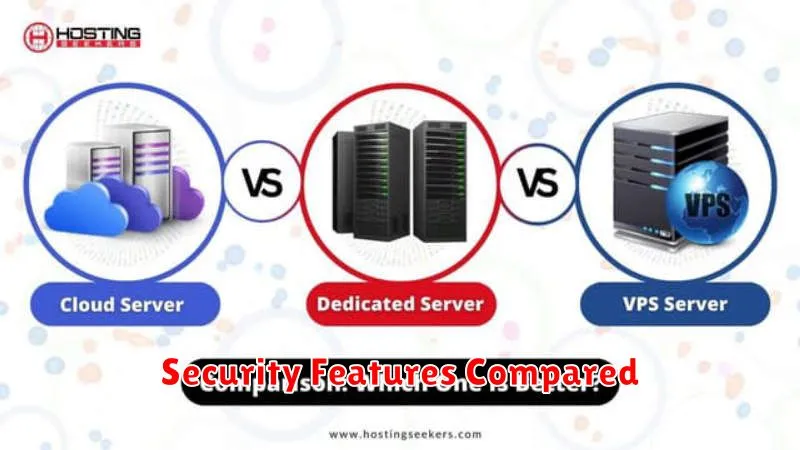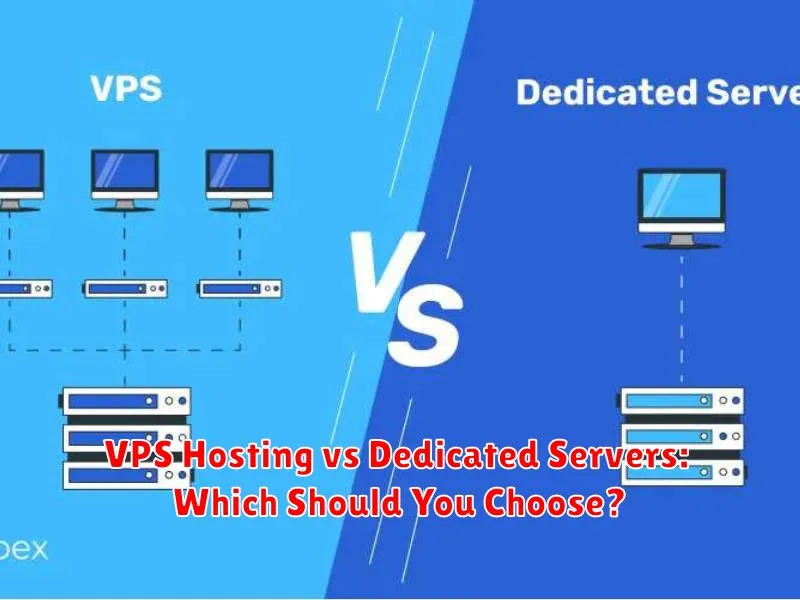Choosing the right web hosting solution is a critical decision for any business or individual seeking a strong online presence. The choice often comes down to two powerful options: VPS hosting and dedicated servers. Understanding the key differences between these two hosting types is essential for making an informed decision that aligns with your specific needs, budget, and technical expertise. This article will delve into the nuances of VPS hosting versus dedicated servers, exploring their respective advantages and disadvantages to help you determine the ideal solution for your website or application.
Both VPS hosting and dedicated servers offer significant advantages over shared hosting, providing greater control, performance, and security. However, they differ significantly in terms of resource allocation, management requirements, and cost. VPS hosting offers a balance of affordability and performance, making it a suitable choice for businesses experiencing growth. Dedicated servers, on the other hand, provide unparalleled power and control, catering to resource-intensive websites and applications. By carefully evaluating your requirements for resources, control, and scalability, you can confidently select the hosting solution that best supports your current and future needs. This guide will provide the insights necessary to make a well-informed choice between VPS hosting and dedicated servers.
Overview of VPS and Dedicated Hosting
Virtual Private Server (VPS) hosting and Dedicated Server hosting represent two distinct tiers of web hosting, each offering a unique set of advantages and disadvantages. Understanding their core differences is crucial for selecting the right hosting solution for your specific needs.
VPS Hosting utilizes virtualization technology to partition a single physical server into multiple virtual servers. Each VPS operates independently, with its own allocated resources (RAM, CPU, storage), operating system, and software. This setup provides a balance of affordability and performance, making it suitable for websites experiencing moderate traffic and requiring greater control than shared hosting.
Dedicated Server Hosting, on the other hand, grants you exclusive access to an entire physical server. This provides maximum performance, control, and security, as all resources are dedicated solely to your website. Dedicated servers are ideal for high-traffic websites, resource-intensive applications, and situations requiring the highest level of customization and security.
The key differentiator between VPS and dedicated hosting lies in resource allocation and cost. While VPS hosting shares resources among multiple virtual servers, dedicated hosting provides complete, unshared access. Consequently, dedicated servers offer significantly higher performance but come at a premium price compared to VPS hosting.
Performance and Resource Isolation
Performance and resource isolation are key differentiators between VPS hosting and dedicated servers. With a dedicated server, you have exclusive access to all the server’s resources, guaranteeing consistent performance regardless of other users’ activities. VPS hosting, while offering a degree of isolation, still shares resources with other virtual servers on the same physical machine. This can lead to the “noisy neighbor” effect, where other users’ resource-intensive activities can impact your VPS performance.
Dedicated servers offer predictable and higher performance ceilings. VPS performance, however, is subject to the overall resource allocation and usage on the physical server. While VPS technology utilizes virtualization to isolate resources, contention can still occur during peak usage times. This can manifest as slower loading times or reduced responsiveness.
In terms of resource isolation, dedicated servers provide complete isolation. You have full control over the hardware and software configuration, ensuring no interference from other users. VPS solutions offer a good level of isolation, but it isn’t absolute. While your environment is separated from others through virtualization, the underlying physical hardware is still shared, which can pose a potential security risk if the hypervisor isn’t properly configured.
Security Features Compared

Security is a critical consideration when choosing between a VPS and a dedicated server. With a dedicated server, you have complete control over the server’s security, allowing for customized configurations and the implementation of specific security measures. This provides a high level of security as you are not sharing resources with other users.
VPS hosting offers a virtualized environment. While you have more control than shared hosting, your security relies partly on the provider’s infrastructure and their implementation of security measures. A breach on another VPS on the same physical server could potentially impact your VPS, though this risk is mitigated by robust virtualization technology.
Both VPS and dedicated servers allow for the installation of custom firewalls, intrusion detection systems, and other security software. However, dedicated servers offer greater flexibility and control over these aspects, making them potentially more secure for highly sensitive data or applications.
Cost Analysis
Cost is a critical factor when deciding between a VPS and a dedicated server. Generally, VPS hosting is significantly more affordable than dedicated server hosting.
VPS plans often start at a low monthly price, making them accessible to individuals and small businesses. You’re essentially sharing server resources, which distributes the overall cost among multiple users.
Dedicated servers, on the other hand, command a premium price. You’re renting the entire server, affording you complete control and access to all its resources. This power and exclusivity come at a higher cost, making it more suitable for larger businesses with demanding resource needs.
While the base cost of a dedicated server is higher, consider the potential hidden costs of a VPS. If you exceed your allocated resources, you may incur overage charges or experience performance degradation. With a dedicated server, you have a fixed set of resources available, offering greater predictability in your monthly expenses.
Scalability for Business Growth
Scalability is a critical factor when choosing between a VPS and a dedicated server. As your business grows, so too will its resource needs. Understanding how each option handles increased traffic, data storage, and processing demands is crucial for long-term success.
VPS hosting offers a good level of scalability. You can typically upgrade your resources (RAM, CPU, storage) relatively easily through your hosting provider. This allows you to accommodate moderate growth without significant disruption. However, you are still sharing resources with other users on the physical server, which can place some limitations on your scaling potential.
Dedicated servers provide the ultimate in scalability. Since you have the entire server to yourself, you have access to all its resources. Scaling up is often simpler and faster than with a VPS. You can add more RAM, upgrade your CPU, or expand storage as needed, offering greater flexibility for handling rapid growth and resource-intensive applications. However, dedicated servers require more proactive management and planning for scaling compared to the often automated processes available with VPS hosting.
Management and Maintenance Requirements
A key differentiator between VPS hosting and dedicated servers lies in management and maintenance responsibilities. With a VPS, the hosting provider manages the underlying hardware and core software, including security patching and server updates. This frees up users to focus on their applications and websites. Users typically have root access for customization, but are not responsible for hardware upkeep.
Dedicated servers, conversely, offer complete control but demand significantly more responsibility. Users manage everything from the operating system and security to hardware maintenance and replacements. This requires significant technical expertise. While offering maximum customization and control, this also entails a larger time investment for ongoing maintenance and management tasks.
Consider your technical capabilities and the resources you have available. If ease of management is a priority, a VPS is likely a better fit. If complete control and customization are paramount, and you possess the technical skills, a dedicated server offers greater flexibility.
Ideal Use Cases for Each
Choosing between a VPS and a dedicated server hinges on your specific needs. VPS hosting excels in scenarios where resources are important but budget remains a constraint. This makes it an ideal choice for small to medium-sized businesses, startups, and personal projects requiring more control and performance than shared hosting. Common examples include hosting websites with moderate traffic, running development servers, or operating small applications.
Dedicated servers are reserved for resource-intensive operations demanding maximum performance, control, and security. Large websites experiencing high traffic volumes, complex web applications, big data analysis, game servers, and mission-critical operations benefit significantly from dedicated resources. Organizations prioritizing data security and requiring complete control over their server environment often choose dedicated hosting.

